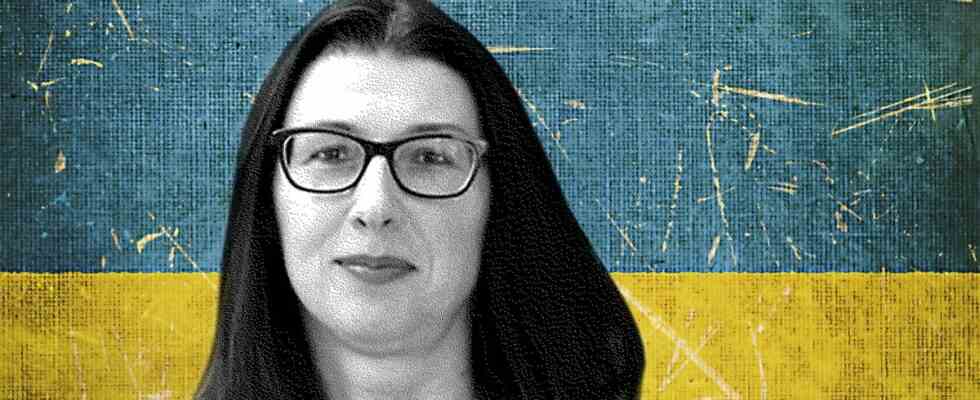Today is March 24th, a little anniversary the “special operation” which, according to the Russian government, is going according to plan. It’s good to hear that everything is going according to plan, because there were also other assessments by the uninitiated: that the Russians want to hold a victory parade in Kyiv in about 48 hours, that the president is retreating to the west, or that the Ukrainian women who have finally been denazified and Ukrainians dance in the streets for hours and greet Russian liberators with bread and flowers. Even a private email to me with an offer of accommodation (because it would be sensible to leave the country) says: “I think that in three weeks the Russian army will have occupied Ukraine.” Others should now take stock – military experts, political scientists, politicians.
A certain routine sets in – you do a lot of things on the side and without emotional effort
Perhaps the Russian plan is that the world should tire of this war and say, “See how you can do it yourself, dear Ukrainians.” Hopefully that won’t happen, but it’s clear that a certain tiredness is spreading, a message on Whatsapp says exactly that: “Here everything is slowly being pushed aside and almost everyone is forgotten.” We here in the hinterland are not allowed to repress anything – only as much as is necessary to persevere, but a certain routine actually sets in. It also means that you can do many things quickly, on the side and without great emotional effort. While my students do some group work, I answer the e-mail about 1000 sets of bed linen to be bought; We will pay for the two washing machines in any case, but please let the electricians choose these, as they have a better idea of whether they can be properly connected in the dorm. And an important aid delivery with insulin from the Romanian Iaşi can hopefully start tomorrow for Chernivtsi. Everything is paid for from the donations for the thought roof network, thank you very much, dear partners of the IKGS and everyone who donated! A few students volunteer to unload and sort the relief supplies, that’s nice, we’ll need hands.
“So many micro-destinies in every story,” a friend from Berlin wrote to me. I take up this expression, thank you, dear CB! A micro fate goes like this: My guest M. received an offer from a well-known German to take in a Ukrainian family, a woman with a child or two children. So far none have been found. During a long taxi ride, M. strikes up a conversation with the taxi driver. The driver says he has a neighbor whose daughter with Down’s syndrome has epilepsy. The woman would like to leave the country, but has no contacts abroad. The daughter’s condition has deteriorated since they had to go to the shelter during the air raid. M. takes care of the matter. In the evening everything is clarified so far. The woman just needs to come to Uzhgorod, from there she will be picked up by a German car. Two doctors are ready to come to receive mother and child and bring them to the Passau area. The daughter is examined in a clinic. Hopefully everything will work out in the temporary new home between hosts and Ukrainian guests. A chance encounter that can have good far-reaching consequences at the micro level.
I see new faces on the bus, you hear a different Russian, a different Ukrainian
A few days ago, when I was leaving the university after work, a young woman at the crossroads asked me how to get to “Rita Steinberg”. “Rita Steinberg” is a restaurant with fine Jewish cuisine. I point the way and at first I think, who is going to the restaurant now… The second thought is – how good that there are people who go to the restaurant, that the gastronomy is working, that there is demand. The next day I overheard that “Rita Steinberg” is usually fully booked. Nice for the staff, nice for the nice waiter I sometimes see outside smoking and say hello.
Two young women in expensive, light-colored clothes with an equally expensive little dog with white fur seem a bit out of place at the final stop, where my guest M. and I get off. The sight is amusing. Here it is no longer a “city”, but country. Sometimes you see a carriage driving on the road. Roosters crow, dogs bark, every house has a piece of garden, residents go shopping without changing their clothes. With a decorative dog and neatly dressed you attract attention. I also see new faces every day on the bus. One often hears a different kind of Russian – a more cultivated one, without a Bukovinian accent. Also a different Ukrainian – without dialectal sprinklings and typical little words borrowed from Romanian, which one does not necessarily understand outside the region. I’m happy about this suddenly arisen diversity, only the occasion is unfortunately very sad. By the way, Chernivtsi would be an exciting research topic at the moment, from a cultural-anthropological point of view. There are interesting actors from the cultural and literary scene here, people from the IT industry, scientists from various universities. I regret not having time for “field research”.
Read more episodes of this column here.

